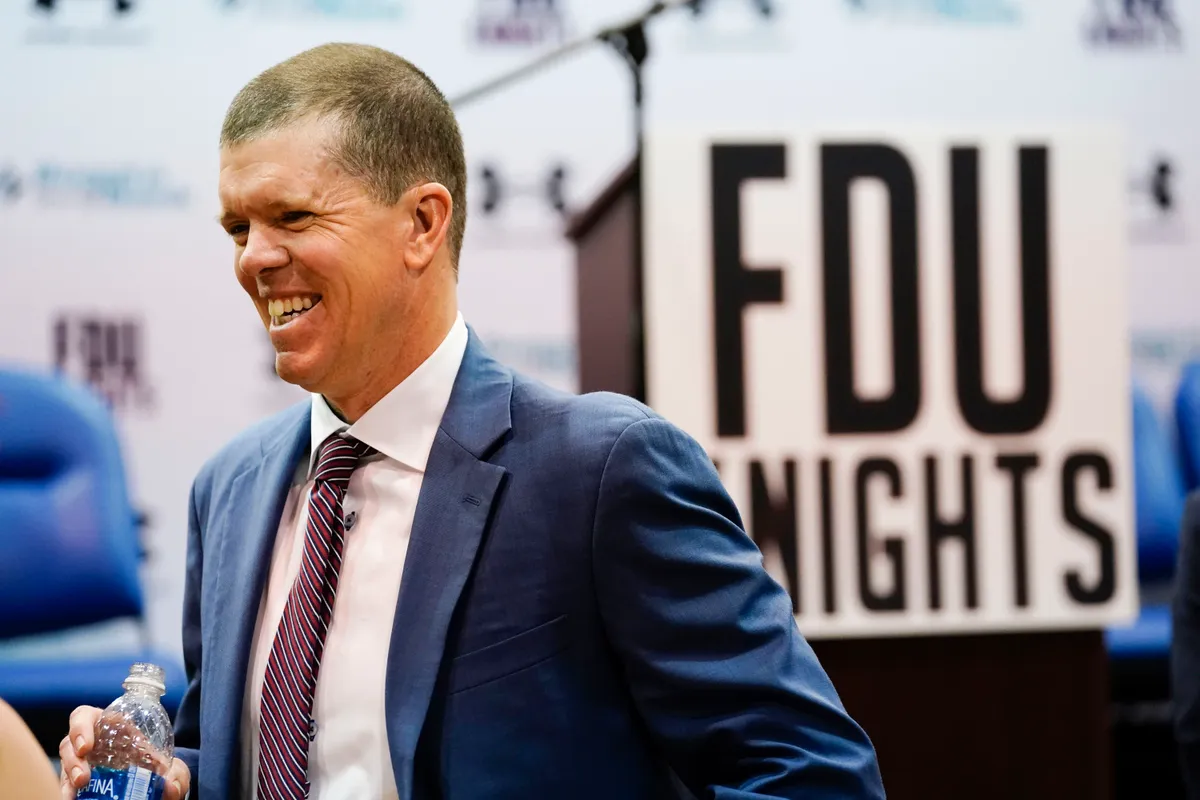Tobin Anderson was named the new Head Coach at Fairleigh Dickinson University in May of 2022 following nine incredibly successful seasons at the Division II level. He was the Head Coach at St. Thomas Aquinas University, where he led the program to a 209-62 overall record, three consecutive ECC conference championships, and seven consecutive NCAA Tournament berths. Having rebuilt a St. Thomas Aquinas program in 2013 and turning it into a perennial top-25 program in Division II, Anderson is well-prepared to do the same at Fairleigh Dickinson University. Recently, Anderson clinched his 400th career win on December 11th, in a 73-71 victory over NJIT.
Can you walk our audience through the search process that resulted in you being offered the exciting opportunity to be the next Head Coach at Fairleigh Dickinson?
It happened quickly. The job opened on a Monday and by Wednesday I was on a Zoom with the AD and Associate AD. By Thursday, I knew I was the top candidate. I found out later that I had been on their radar for a long time and when it opened, they were definitely going to talk with me. I feel that most jobs have their shortlist before it opens, luckily enough I was already on their shortlist! STAC (St. Thomas Aquinas University) is 20 miles from FDU. They were well aware of our success, which was helpful. My tradition of turning programs around helped and made it a great fit for everyone.
While fresh in your mind, what would you now suggest three priorities be for someone’s first 30 days as a new Head Coach taking over a DI program?
I think the priorities depend on the situation. For me, coming from the outside, I had to try and learn as much as I could about the current players on the roster. We were able to get two practices in before my press conference and their final exams, so I got a feel for them on the court. I watched a ton of tape, and I wanted to learn as much as I possibly could. I got their grades. I asked a lot of questions. I tried to get a feel for each guy and their fit for the future of our program.
The second most important thing was putting our staff together. My Associate Head Coach at STAC was going to get the job there, but I knew I would bring two of my other guys from there. I knew who I wanted to hire and reached out to them right away. We had our staff together in a short amount of time, which allowed us to get to work right away.
The third thing was finding out who we could recruit. We had a number of open scholarships, so we wanted to find guys who were the right fit for us. Hard workers. Guys who compete. High-character players who could help us win. There are so many options, so we had to sift through a lot of guys to find the players who fit us.
Having arrived at FDU after success as a Head Coach at the DII and DIII levels, what advice do you have for non-Division I head coaches who desire to become a DI Head Coach?
It’s tough because DI ADs and search firms really don’t want to hire small college head coaches who have had success. It can be frustrating, but it is a reality, and the best thing you can do is continue to build your program in every way. Winning games is huge, but being visible, doing clinics, having a social media presence, and making your program special in other ways are important. For example, at STAC, we had one of the best and biggest tip-off dinners on the East Coast.
I got to a point where I loved what we had built at STAC and if a DI program didn’t happen, I was happy to stay at STAC and win at a high level with great players and people. We had something special and that meant more than chasing jobs that didn’t make sense. I was told numerous times that I should go back to being a DI assistant, but I loved being a Head Coach at the scholarship level.
It’s important to keep making connections, especially from a recruiting standpoint, because if it does happen, you want to be in a position to not only get to DI but win at this level. That is our goal at FDU. Build a championship-caliber program where we are contending for a conference championship every year. I am excited about the challenge, and I truly feel that my successful head coaching and program-building success at both DII and DIII have prepared me for this level.

